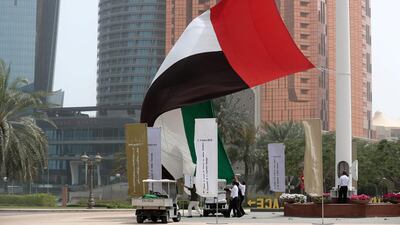Abu Dhabi’s $10 billion (Dh36.7bn) multi-tranche international bond issuance received strong interest from international investors that pushed the orderbook of the deal two-and-a-half times the funds raised, Abu Dhabi’s Department of Finance said.
The emirate’s September 23 issuance, which has a Aa2 rating from Moody's Investors Service, remains the tightest priced sovereign bond deal from the Middle East and North African region, underpinning the credit fundamentals of the government, the department said in a statement carried by Wam. The size of the orderbook, peaking at more than $25bn, with orders coming from over 650 unique accounts indicated strong investor confidence in Abu Dhabi’s credit profile.
The deal comprised three tranches: $3bn paper yielding 2.125 per cent interest due in 2024 was priced 65 basis points above the US Treasuries. Its $3bn tranche offering 2.5 per cent interest due in 2029 was priced 85 bps over Treasuries and the final $4bn deal yielding 3.125 per cent interest due in 2049 came in at 110 bps over Treasuries.
“We are pleased to witness the achievement of the lowest ever coupons by the government ... since the debut issuance in 2007,” Jassem Mohamed Al Zaabi, chairman of the department of finance, said, adding that this is a reflection of trust investors have in the growth strategy of the emirate as well as its high financial buffers.
"Abu Dhabi's exceptionally strong balance sheet supports the very high fiscal strength score with assets worth an estimated 233 per cent of gross domestic product," Moody's said in an October 1 note.
As part of their plan to wean themselves off oil revenues, Gulf countries are diversifying their economies, modernising education curricula and developing industries.
With low interest rates and the cost of borrowing dropping, tapping debt markets is an ideal way for governments to raise financing. Privatisation of state-owned entities is another medium employed by governments as they look to fund their economic diversification initiatives.
Abu Dhabi, which accounts for about 6 per cent of the world’s proven oil reserves, last tapped the international debt markets with a $10bn three-times oversubscribed bond deal in October 2017. Bahrain, last month also raised $2bn when it sold $1bn of sukuk, due in 2027 and a $1bn conventional bond maturing in 2031. Saudi Arabia, the biggest Arab economy, is said to be considering plans to tap the debt market later this year, according to media reports.
BNP Paribas, Citigroup, First Abu Dhabi Bank, HSBC, JP Morgan and MUFG are joint lead managers and joint bookrunners on Abu Dhabi’s latest foray into international markets. Abu Dhabi Commercial Bank and SMBC Nikko were co-lead managers for the debt offering, according to the statement.
The final geographical split of allocation for the bonds for international and the Middle Eastern investors stood at 78 and 22 per cent, respectively. The 5-year bond was split 75 per cent to the international investors and 25 per cent to investors from the Mena region.
The allocation for the 10-year bonds was 68 per cent to the international investors and 32 per cent to investors from Mena, while the split for the final 30-year tranche was 91 per cent to international investors and remaining 9 per cent to Mena investors.


